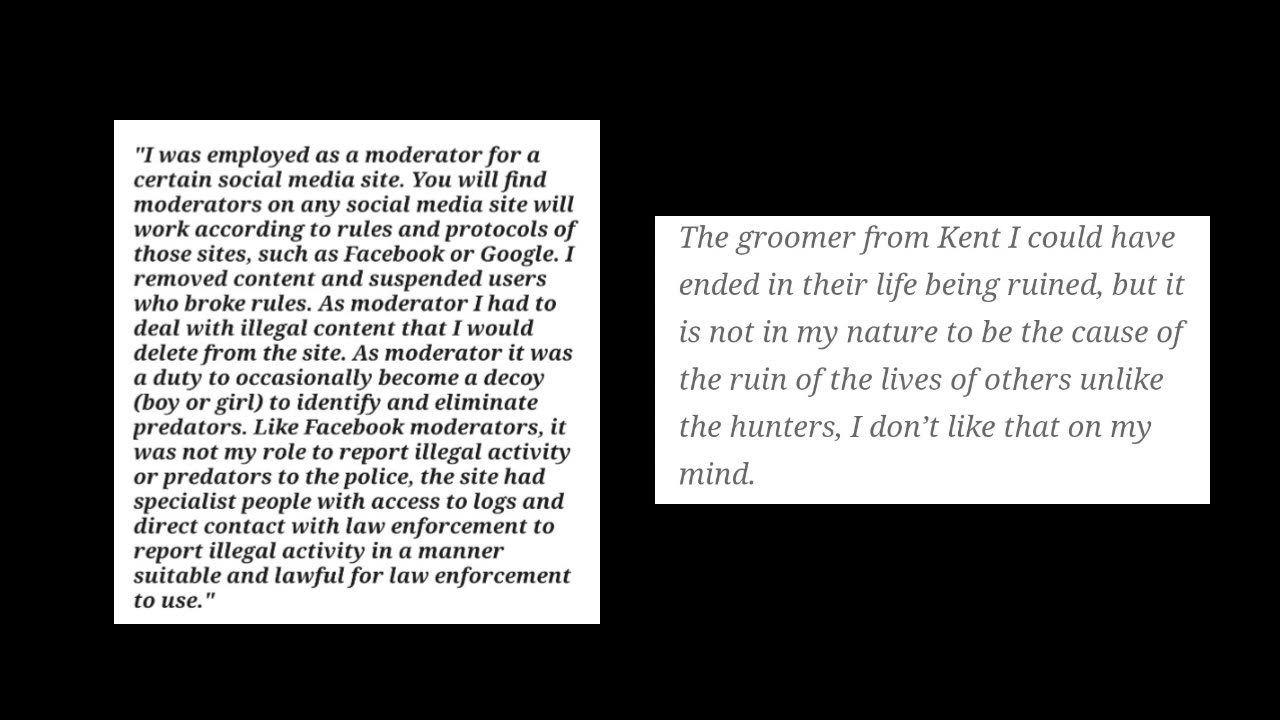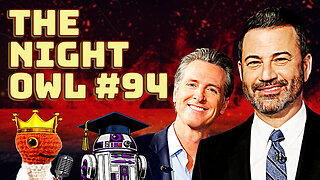Premium Only Content

The Ethical Obligation of Moderation.
The role of a moderator on a popular social media platform, especially one frequented by both children and adults, carries immense responsibility. As the digital landscape has grown, these platforms have become arenas where interaction between vastly different age groups occurs, and with that comes the risk of inappropriate, illegal, or harmful behaviours, such as grooming by paedophiles. This essay will explore the morality of a moderator's decision to refrain from reporting such behaviour, particularly when motivated by a reluctance to "ruin someone's life."
Moderators on social media platforms are not simply passive overseers of content; they are gatekeepers of safety and ethical interaction. Their role often involves identifying and removing harmful content, enforcing community guidelines, and in more extreme cases, reporting illegal activities to law enforcement. Given the presence of children on these platforms, there is an increased moral duty to protect them from predators, who use anonymity and trust-building tactics to groom minors for exploitation.
In this context, when a moderator becomes aware of a paedophile groomer's actions and chooses not to report it, they are shirking a significant ethical obligation. Protecting vulnerable users, particularly children, should be paramount. Failure to act allows harm to continue and even escalate, with long-term, devastating consequences for the child victim. The moral question of inaction, then, must be viewed in light of this duty to safeguard others from abuse and exploitation.
The Cost of Inaction.
When a moderator fails to report a paedophile groomer, they are prioritising the emotional or psychological discomfort of the predator over the safety of a child. While the idea of ruining someone's life might be distressing, it is critical to remember that the individual in question has chosen to engage in criminal and predatory behaviour. This is not a situation where the moderator is contemplating punishment for a minor infraction but rather the ongoing abuse and manipulation of a child.
By not intervening, the moderator becomes complicit in the harm being done. Their silence effectively allows the predator to continue, placing other children at risk. From a consequentialist perspective, the negative outcomes of inaction far outweigh the emotional discomfort of reporting. The victimised child suffers not only from the trauma of abuse but also from a system that fails to protect them. The wider community, too, suffers as it becomes less safe, and trust in the platform and its moderation system diminishes.
Misplaced Sympathy.
One of the primary arguments for not reporting might stem from a misplaced sense of sympathy for the groomer, who, once exposed, will likely face legal consequences, public condemnation, and the potential for a ruined life. While it is important to acknowledge the complexities of human behaviour and the possibility of rehabilitation for some offenders, this sympathy cannot outweigh the need to protect children.
It is also worth questioning whether the reluctance to report stems from a more self-centred concern—the moderator’s discomfort at being the one to deliver news that leads to severe consequences. This aversion to guilt or responsibility for another person’s downfall may seem humane on the surface, but it masks a deeper moral failing: the prioritisation of one’s own emotional comfort over the safety and well-being of others. True morality often requires uncomfortable actions, especially when they involve protecting the vulnerable.
The Moral Harm of Silence.
Silence in the face of abuse is not morally neutral; it is an action in itself. To stand by while a predator operates unchecked is to condone that behaviour, even if implicitly. This silence can cause tremendous harm, not only to the child being groomed but also to the broader community, which relies on moderators to maintain a safe space. The idea of "ruining someone’s life" should be weighed against the actual harm being done to children who are targeted, groomed, and potentially abused.
Moreover, the refusal to act reinforces a culture of permissiveness around child exploitation. It sends a message that predators can operate with relative impunity, as long as those in positions of power and responsibility choose not to act. For the children who are targeted, this failure to protect them represents a profound betrayal of trust.
The Role of Justice.
It is critical to consider the broader implications of justice when evaluating the morality of reporting a groomer. Justice is not simply about punishment; it is about restoring balance and ensuring that those who harm others are held accountable for their actions. Reporting a paedophile is not an act of cruelty or vengeance but rather a necessary step toward protecting victims and preventing future abuse.
The reluctance to "ruin" the predator’s life overlooks the reality that their actions have already begun to ruin the life of the child they target. The notion of justice demands that those who harm others, especially children, face consequences for their actions. These consequences are part of a legal and moral system designed to protect the innocent, deter potential offenders, and rehabilitate those who are capable of change.
In Conclusion.
The morality of a moderator’s decision to avoid reporting a paedophile groomer because they fear ruining the offender’s life is deeply flawed. While it is natural to feel conflicted about the consequences of one's actions, the primary responsibility must always be to protect the vulnerable—especially children. By failing to report, the moderator allows harm to continue, prioritises the well-being of the predator over the victim, and undermines the very role of moderation in maintaining a safe online environment. Morally, the cost of inaction is far too high, and justice demands that those who exploit children be stopped.
-
 22:04
22:04
Scammer Payback
14 hours agoCrazy Scammers Spoof Emergency 911
50.7K9 -
 8:28
8:28
Misha Petrov
19 hours agoLiberals OUTRAGED Over Carrie Underwood Performing at Trump’s Inauguration
33.1K36 -
 22:34
22:34
Degenerate Plays
22 hours ago $2.37 earnedWe're Having Bedroom Problems... Literally - Five Nights At Freddy's 4 : Part 5
19.1K -
 1:00:10
1:00:10
Trumpet Daily
21 hours ago $6.32 earnedThe War to Restore America - Trumpet Daily | Jan. 14, 2025
20K8 -
 36:30
36:30
PMG
11 hours ago"Hannah Faulkner and Terrance Williams | DEI IS KILLING AMERICANS"
335 -
 2:51:47
2:51:47
Price of Reason
16 hours agoJimmy Kimmel ATTACKS Trump and PROTECTS Gavin Newsom! Skeleton Crew Finale REVIEW! Ubisoft DEI Woes!
42.5K21 -
 5:14:42
5:14:42
JdaDelete
1 day ago $23.62 earnedThe Legend of Zelda: Skyward Sword HD | With SirPoopsMagee | Part 4
101K13 -
 4:56:18
4:56:18
Sgt Wilky Plays
13 hours agoTesting New setup and Chillin
86.4K5 -
 53:37
53:37
barstoolsports
19 hours agoOne Text Changes The Game | Surviving Barstool S4 Ep13
99.6K7 -
 3:14:48
3:14:48
Laura Loomer
12 hours agoEP93: Senate Grills Trump Admin Nominees As Inauguration Approaches
54.2K34